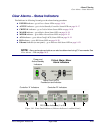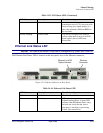
Access Navigator - Release 1.8 August 2003 14-19
Alarm Clearing
Minor Alarm Status LEDs
Minor Alarm Status LEDs
A minor alarm means that a non-service affecting condition exists, or that a condition exists affecting
service to few customer lines (2 to 23) or has the potential to affect traffic, or that a protection switch
occurred. Minor faults include:
l IDLC link failure (primary or secondary EOC/TMS fails) if backup is active
l IDLC link out of service because of loopback test
l Standby Controller card removed or failed
l Self-test failure (in redundant system)
l Power input -48V missing or too low
Alarm Cutoff (ACO) Status LED
The Alarm Cutoff feature permits the operator to temporarily silence the alarm outputs while testing and
repairing the Access Navigator. ACO does not stop DS1 alarm messages.
Pressing the ACO pushbutton switch disables the alarm relays and lights the ACO status LED. This
keeps the relay contacts open on the Alarm Output connector. If another alarm occurs, the alarm relays
will be enabled again and the ACO status LED will go off.
Alarm Cutoff disables the following signals on the Alarm Output connector:
l Critical alarm
l Major alarm
l Minor alarm
Table 14-13. Minor Alarm Status LEDs
LED State Description Troubleshooting
Off No minor alarms present Alarms appear only on the active
Controller.
Yellow Minor alarm exists Use the state of the Power LEDs, Active/
Standby status LEDs, and DS1 status
LEDs to help locate the source of the
fault.
Table 14-14. Alarm Cutoff (ACO) Status LEDs
LED State Description Troubleshooting
Off Alarm(s) active Normal operation. Any alarms will
produce relay closures on the Alarm
Output connector.
Yellow Alarm(s) suppressed ACO disables the alarm relays so that all
contacts remain open on the Alarm
Output connector.


















